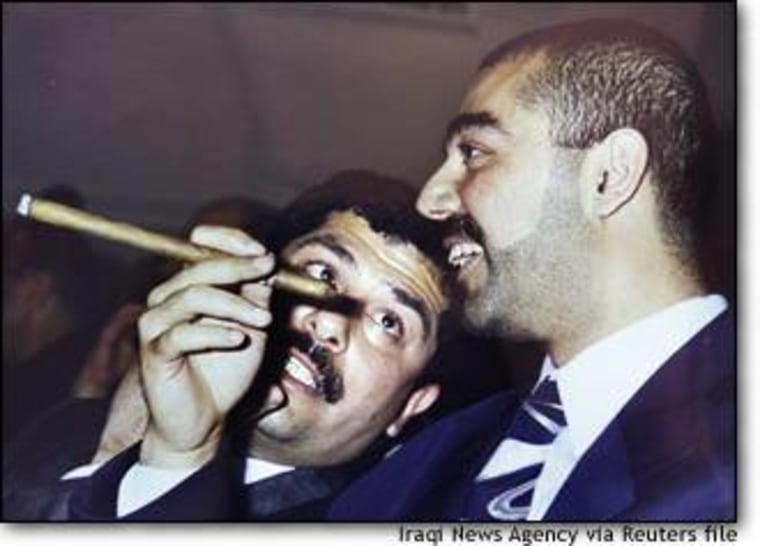The death of Saddam Hussein’s two powerful and notorious sons represents a withering blow to Iraqi Baath Party loyalists who hope to wait out the American occupation and restore the regime to power. At the same time, the elimination of Qusai and Odai Hussein will likely be greeted with relief at the White House, which has been dogged by questions about the war’s motives and increasingly concerned at the daily deaths and injuries inflicted on American troops.
ASIDE FROM THE capture of Saddam himself, the U.S. military rated no single goal more important in Iraq than the capture or death of Saddam’s sons. In particular, Qusai Hussein — at 36 years old, Saddam’s heir apparent and the commander of Iraq’s Republican Guard — represented the future for Iraq’s tenacious Saddam loyalists.
The psychological impact on the larger Iraqi public is almost impossible to predict, of course, but the blow delivered to loyalists fighting a guerrilla campaign against the U.S.-led occupation will be significant. U.S. military officials, including the officer who leads U.S. Central Command, Gen. John Abizaid, recently said they believe that elements of the deposed Baathist regime were coordinating and financing the increasingly sophisticated guerrilla attacks on U.S. forces, particularly the so-called “Sunni triangle” north of Baghdad containing Saddam’s ancestral home, Tikrit. Analysts have suggested that, while Saddam is likely to have gone deep underground if he is still alive, his sons likely were involved in planning and inspiring continued resistance.
A VICTORY, DEAD OR ALIVE?
U.S. military officials and the Bush administration initially reacted cautiously to early reports suggesting Odai, Qusai, a bodyguard and possibly Qusai’s young son, Mustapha, all died in the four-hour gunfight with U.S. special operations forces in the northern city of Mosul. But at a news conference Tuesday, Army Lt. Gen. Ricardo Sanchez, the commander of allied military operations in Iraq, confirmed Saddam’s sons were killed.
Even as Al Jazeera broadcasts suggested, without offering evidence, that these deaths would spark widespread unrest, there appeared to be a consensus, at least on the American side, about the importance of the operation.
Bernard Trainor, a retired Marine Corps general and military analyst, said the deaths of Saddam’s sons represents “a tremendous blow to the Baathist regime and a real boon for those Iraqis seeking to pursue a Saddam-free future, cooperating with the U.S. This is a major event that can only be topped by getting Saddam himself.”
Con Coughlin, an authority on Iraq and author of “Saddam: King of Terror,” agreed: “It will reinforce the message to the Iraqi people that the Americans and America’s coalition allies are very, very serious about getting rid of Saddam Hussein once and for all so Saddam cannot make a comeback.”
The inability to take either brother alive, however, is something both regretted. Col. Jack Jacobs, a military analyst for MSNBC and retired Army infantry commander, said that undoubtedly would have been a key goal, especially given the fact that Qusai had reportedly been put in charge of dispersing Saddam’s weapons of mass destruction ahead of the war. “But you can’t always do it.”
However, Jacobs predicted that a successful operation against Saddam’s sons would result in “a cascading effect of getting good intelligence and acting on it immediately.”

NO TEARS LIKELY
Outside of those in Iraq who long ago cast their lot with Saddam’s regime, there will be few tears shed for either of his sons.
Odai, the older of the two at 39, once was considered Saddam’s likely successor. But his behavior was so erratic — at one point, he executed Saddam’s favorite bodyguard in a pique of drunken anger — that he was sidelined from major regime posts.
Nonetheless, he remained head of the Iraqi Olympic committee, whose athletes, it was revealed after the war’s end, he sometimes tortured as punishment for poor performances. He also was publisher of the Baghdad daily Babel and retained a seat in parliament.
Odai also took part in executing thousands of Iraqi Shiites who rose against Saddam in the aftermath of the first Gulf War, and possibly in retribution, nearly died in a 1996 assassination attempt most believed to be the work of the Shiite group Dawa. The attack left him partially paralyzed.
Qusai, while considered a more stable character, also inspired fear among those he ruled. As head of Iraq’s Special Security Organization, as well as the Republican Guard and Special Republican Guard, he arguably was the most powerful man in Iraq after his father. His control of internal security organs made him, in effect, the Heinrich Himmler of Iraq, ordering massive sweeps against political dissidents, Christian, Kurdish, Turkoman or other minority groups, and authorizing the slaughter and torture that often followed.
Of particular note, human rights experts say, was Qusai’s role in exacting retribution against Iraqi Shiites of southern Iraq, whose unique marsh-based culture had been the subject of anthropological studies for decades. The so-called marsh Arabs lost much of their culture when, following the Shiite rising that followed the 1991 Gulf War, Qusai oversaw the draining of the marshes.
“That culture was of course built around water and around life in the marshes and that culture has been destroyed,” writes Joseph Dellapenna, an authority on international law at Villanova University Law School, “and, I would argue, deliberately and purposefully destroyed, precisely because they were people hard to control and a people who had risen in revolt.”
Michael Moran is senior correspondent of MSNBC.com
